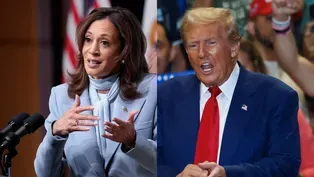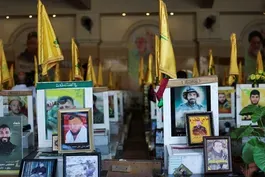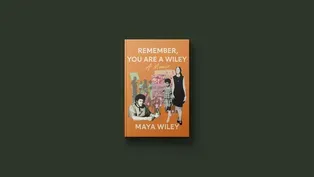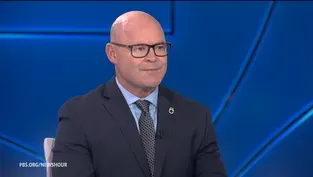
Who are the undecided voters and what are they thinking
Clip: 9/19/2024 | 5m 44sVideo has Closed Captions
Who are the undecided voters and what are they thinking
With the race for the White House as close as ever, the election could come down to a small number of undecided voters. But in a hyper partisan political climate, who are those people that are still unsure? NPR's Domenico Montanaro spoke to a handful of undecided voters who have responded to our regular PBS News/NPR/Marist poll and joined Amna Nawaz to discuss what they’re thinking.
Problems with Closed Captions? Closed Captioning Feedback
Problems with Closed Captions? Closed Captioning Feedback
Major corporate funding for the PBS News Hour is provided by BDO, BNSF, Consumer Cellular, American Cruise Lines, and Raymond James. Funding for the PBS NewsHour Weekend is provided by...

Who are the undecided voters and what are they thinking
Clip: 9/19/2024 | 5m 44sVideo has Closed Captions
With the race for the White House as close as ever, the election could come down to a small number of undecided voters. But in a hyper partisan political climate, who are those people that are still unsure? NPR's Domenico Montanaro spoke to a handful of undecided voters who have responded to our regular PBS News/NPR/Marist poll and joined Amna Nawaz to discuss what they’re thinking.
Problems with Closed Captions? Closed Captioning Feedback
How to Watch PBS News Hour
PBS News Hour is available to stream on pbs.org and the free PBS App, available on iPhone, Apple TV, Android TV, Android smartphones, Amazon Fire TV, Amazon Fire Tablet, Roku, Samsung Smart TV, and Vizio.
Providing Support for PBS.org
Learn Moreabout PBS online sponsorshipAMNA NAWAZ: With the race for the White House as close as ever, the election could come down to a small number of undecided voters.
But in a hyperpartisan political climate, who are those people that are still unsure?
NPR's Domenico Montanaro spoke to a handful of undecided voters who have responded to our regular PBS News/NPR/Marist poll.
He's here to walk us through what they're thinking.
Good to see you.
DOMENICO MONTANARO, Political Editor, NPR: Good to see you too.
AMNA NAWAZ: So, when we talk about undecideds, how many people are we -- how big is this bloc?
And how are they still undecided?
DOMENICO MONTANARO: It is a tiny slice of people.
We're talking in recent years anywhere from 6 percent who are genuinely persuadable to maybe the low teens, right?
And really in this election, given how people know so much about Donald Trump, in particular, and when President Biden was running, it was a really, really small number of people.
I mean, in our poll, it was like 3 percent of people who were undecided.
And then when Harris got in, we saw a dip in that, and there were more people who moved to be undecided.
But still it was only about 9 percent of people.
But immediately after that as soon as they started to see a little bit more about Kamala Harris, people started to make up their minds.
AMNA NAWAZ: So in these big election events, post-debate, for example, where are they now and what should we take away from the shifts you're laying out?
DOMENICO MONTANARO: Well, so in the NPR/PBS News/Marist poll, we had 46 people over the last several months who said that they were undecided.
And what I did was reach out to 10 of them and we had five men, five women.
And after the debate -- this was all-post debate - - four of them said that they're now leaning toward Kamala Harris or that they're voting for her.
Two of them said that they were leaning toward Trump.
Four of them are undecided still and three of them very well might not vote at all.
What I found really interesting about this when I started to look at it, clear takeaways, two things.
One, the debate was really, really important for Kamala Harris, because there were a lot of people who just didn't know enough about her, needed some reassurance maybe, and then starting to make their decisions.
The other big takeaway is a gender divide is very, very real.
All four of the people who said that they're going to now be voting for Harris or leaning toward her or women.
AMNA NAWAZ: You spoke to one woman in Arkansas who spoke to this, right?
Tell us about her.
DOMENICO MONTANARO: Yes, I talked to Jene Proffitt of -- from Arkansas.
And she was very interesting.
She said: "I feel that Trump's disrespect for women is not befitting a president.
He is not someone I want my girls to look up to as a role model."
She's 45 years old.
She's a mother of five.
She did not vote in the 2020 election.
She did vote for Donald Trump in 2016.
I asked her if she's going to vote this time, and she said that she has made up her mind to vote for Kamala Harris because of how Trump talks about women.
I asked her, but you didn't vote last time.
How are you feeling about this election?
She said, I really want my girls to see that this is a right and that she feels very strongly about the fact that this is a right that she needs to exercise.
AMNA NAWAZ: Interesting here you're seeing gender plays a role here, but what are some of the other issues that you think are going to impact these undecided votes?
DOMENICO MONTANARO: Yes, I would say five of the people who I talked to just are not going to vote for Kamala Harris, but they have real hangups about Donald Trump.
And that's why I think some of them just may not vote at all.
One person that I talked to, Brady from Wisconsin, he's 30 years old, and he mentioned as did a lot of these folks about prices and immigration.
He talked mostly about prices.
He said: "I have probably a middle-class income for my family and it doesn't feel like it's getting any easier even as my wife and I have advanced in our careers."
So you're 30 years old, coming of age, you're trying to buy groceries, you're trying to get a mortgage, we know interest rates have been higher, and it's a real concern for people like Brady.
Heard from another person, John in Miami, in Florida, who said that he also just feels like it's just too much.
He's somebody who voted for Obama twice, says he worked the phones for him, but this time around he's just not sure what he's going to do because -- I think when you look at this, a little bit is -- and I don't know how much of it's gender, OK, and I think that's something to talk about.
But I also think that it's a little bit about incumbency.
In 2008, obviously, the economy wasn't doing very well.
George W. Bush was the president.
He was a Republican, so these guys went with the Democrat in Obama.
And this time around, you have Joe Biden who's in the White House, and even though Kamala Harris has really made the case for being a change agent, she's still tied to the administration.
AMNA NAWAZ: So the economy, immigration are clearly issues.
What about this key issue for Democrats we hear about, abortion rights?
Did you talk to anyone for whom that's a big issue?
DOMENICO MONTANARO: Well, one thing that we have seen in our polling is that abortion rights and Kamala Harris being trusted on abortion rights is by a wider margin than any of the other issues that Donald Trump has advantages on.
And this is definitely a key issue for multiple women that I talked to, including Dr. Linda Remensnyder from Illinois.
She said: "I watched her.
I listened to her.
I'm a woman, and women's knees are first, even before party."
She put the blame squarely on Donald Trump for the overturning of Roe v. Wade.
I talked to another voter in Idaho, a woman who said a lot of her family are MAGA, she said, but she said that she has never voted for Donald Trump.
She was very much a never-Trump Republican, never bought what Trump was trying to sell, even though she's a Republican.
Dr. Remensnyder in Illinois, also a Republican,and she said she was very much hoping Nikki Haley would run.
She was a little -- she didn't really feel like Kamala Harris answered all the questions in the debate, but she feels that she's much more credible than Joe Biden.
She had real concerns.
She's a retired doctor.
She felt like Joe Biden couldn't handle the job as president anymore, said Kamala Harris is a litigator.
She makes the case.
So she thinks that she can do the job.
AMNA NAWAZ: Fascinating look at a small, potentially significant slice of the electorate.
DOMENICO MONTANARO: Potentially the deciders, yes.
AMNA NAWAZ: NPR's Domenico Montanaro, always good to see you.
Thank you.
DOMENICO MONTANARO: You too.
Thank you.
Economists explain hidden downfalls of ending taxes on tips
Video has Closed Captions
Economists explain hidden downfalls of ending taxes on tips (8m 11s)
Harris campaigns with Oprah, Trump focuses on immigration
Video has Closed Captions
Harris campaigns with Oprah in Michigan as Trump focuses messaging on crime, immigration (3m 29s)
Hezbollah leader says Israel crossed a line and vows revenge
Video has Closed Captions
Hezbollah leader says Israel crossed a line and vows revenge for pager, radio attacks (3m 25s)
Maya Wiley chronicles activism and family legacy in memoir
Video has Closed Captions
Maya Wiley chronicles a life of activism and fulfilling a family legacy in new memoir (7m 21s)
Papua New Guinea struggles to monitor deep-sea mining
Video has Closed Captions
Papua New Guinea leaders struggle to monitor deep-sea mining activities off its coast (11m 23s)
Teamsters chief on why the union won't make an endorsement
Video has Closed Captions
Teamsters chief on why union won't endorse Trump or Harris: 'Our system is broken' (7m 33s)
Providing Support for PBS.org
Learn Moreabout PBS online sponsorshipSupport for PBS provided by:
Major corporate funding for the PBS News Hour is provided by BDO, BNSF, Consumer Cellular, American Cruise Lines, and Raymond James. Funding for the PBS NewsHour Weekend is provided by...

















